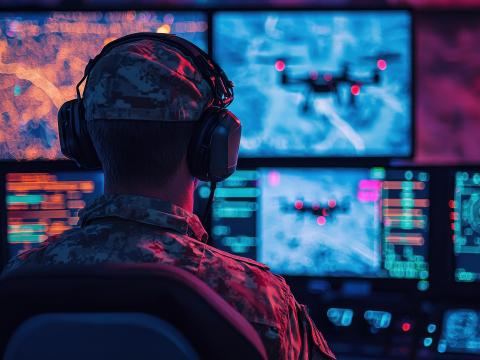Transformational Data Will Define Military Operations
Artificial intelligence and machine learning are two of the many technologies that will change the way the military operates, according to a panel of experts. However, despite the revolutionary innovations that lie ahead, humans always will need to be the controlling factor in any operation.
These experts offered their views of the future on the second day of AFCEA’s TechNet Asia-Pacific 2018, held November 14-16 in Honolulu. In a panel sponsored by the Young AFCEANs, the five experts presented a younger generation’s perspective on the advantages and pitfalls of a data-centric battlespace.
“Our targets don’t tell us what their plans are or what their intentions are, but that is exactly what our customers want,” said Robert J. Runser of NSA Hawaii. “It is the data scientists developing data analytics that will drive intelligence in the future.”
You need to have people who understand how to apply which algorithm to which dataset. AI and ML will never replace the human; they simply will make the human do better—Robert J. Runser, @NSAGov Hawaii #AFCEATechNet
— Bob Ackerman (@rkackerman) November 15, 2018
With all this data, artificial intelligence (AI) and machine learning (ML) will be necessary. “The amount of data that goes to an analyst is enormous to the point of alarm fatigue,” said Vincent Lee of Leeward Community College. “I call AI assistive technology,” he added. “It’s not going to replace what we have in front of us in the foreseeable future.”
I call [AI] assistive technology. It’s not going to replace what we have in front of us in the foreseeable future.—Vincent Lee, @LeewardCC #AFCEATechNet
— Bob Ackerman (@rkackerman) November 15, 2018
“Right now, with what we have in AI, we’re able to make the user experience better,” said Chuck Weissenborn of Symantec. But, echoing Lee, he said, “It’s important to remember that people still have to be there [in the loop].”
It’s important to remember that people still have to be there [in the loop].—Chuck Weissenborn, @symantec #AFCEATechNet
— Bob Ackerman (@rkackerman) November 15, 2018
The focus of much of this new data construct is the cloud. “NSA has been undergoing a cloud transformation for 10 years” Runser stated. “The goal is to get all of our data that is not real-time into the cloud. With the transition to the cloud, we have instituted a new data security framework.”
NSA has been undergoing a cloud transformation for 10 years. The goal is to get all of our data that is not real time into the cloud.—Robert J. Runser, @NSAGov Hawaii #AFCEATechNet
— Bob Ackerman (@rkackerman) November 15, 2018
Still, panelists warned that all this data requires a protection strategy. The onslaught of data threatens to overcome the advantages it brings. “I never met a dataset I didn’t like, and that is one of our biggest problems,” said Mike Henry of The MITRE Corporation. “I don’t expect that the data is ever going to plateau.”
I never met a dataset I didn’t like, and that is one of our biggest problems.—Mike Henry, @MITREcorp #AFCEATechNet
— Bob Ackerman (@rkackerman) November 15, 2018





Comments